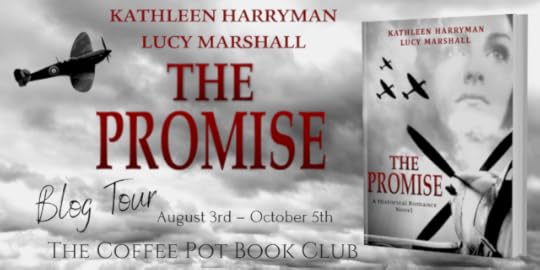Mary Anne Yarde's Blog: The Coffee Pot Book Club , page 73
August 31, 2020
Welcome to Day #5 of the blog tour for The Promise #HistoricalRomance #WW2 @KathleenHarrym1 @cathiedunn
The Promise
A World War II Historical Romance
By Kathleen Harryman and Lucy Marshall
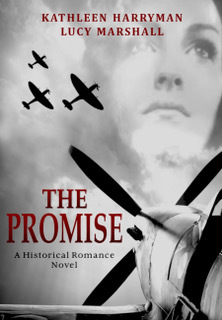
How far would you go to keep a promise?
In the heat of battle, one man's promise to another will be tested.
September 1939
As Britain is gripped by the fear and uncertainty of war, Tom Armitage stands to gain the one thing that he never thought possible - his freedom.
Rosie Elliot sees her future crumbling to dust as Will Aarons leaves Whitby with Jimmy Chappell to fight in the war. As she begins work at The Turnstone Convalescent Home, Rosie finds something she thought she had lost. Friendship. But friendship soon turns to love. Can this new love replace Will?
This is not an ordinary love story.
It's a story of love, loss, courage, and honour.
Of promises that must be kept or risk losing everything you've ever held dear.
Today we are stopping over on Cathie Dunn Writes... for a sneak-peek between the covers of The Promise.
Click HERE!

August 30, 2020
Take a sneak-peek inside the covers of David Blixt's fabulous book — What Girls Are Good For #HistoricalFiction @David_Blixt

What Girls Are Good For
By David Blixt
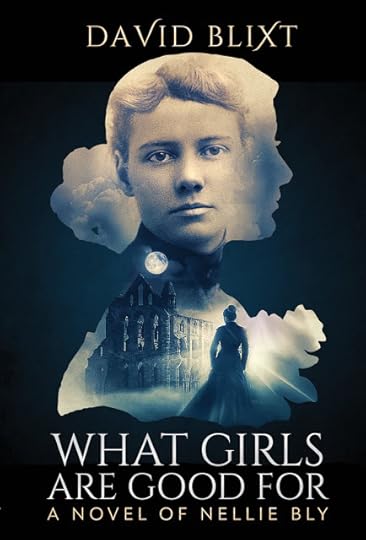
Nellie Bly has the story of a lifetime. But will she survive to tell it?
Enraged by an article entitled ‘What Girls Are Good For’, Elizabeth Cochrane pens an angry letter to the Pittsburgh Dispatch, never for a second imagining a Victorian newspaper would hire a woman reporter. Taking the name Nellie Bly, she struggles against the male-dominated industry, reporting stories no one else will—the stories of downtrodden women.
Chased out of Mexico for revealing government corruption, her romantic advances rejected by a married colleague, Bly earns the chance to break into the New York’s Newspaper Row if she can nab a major scoop – life inside a madhouse. Feigning madness, she dupes the court into committing her to the Insane Asylum on Blackwell’s Island.
But matters are far worse than she ever dreamed. Stripped, drugged, beaten, she must endure a week of terror, reliving the darkest days of her childhood, in order to escape and tell the world her story. Only, at the end of the week, no rescue comes, and she fears she may be trapped forever. . .
Based on the real-life events of Nellie Bly’s life and reporting, What Girls Are Good For is a tale of rage, determination, and triumph—all in the frame of a tiny Pennsylvania spitfire who refused to let the world tell her how to live her life, and changed the world instead.
Excerpt
From Chapter Forty-Four of What Girls Are Good For.
Feigning madness, Nellie Bly has gotten herself committed to the Insane Asylum on Blackwell’s Island. After being interviewed by reporters fascinated by “Nellie Brown,” Bly is left alone with the sole kind physician on the island, Dr. Frank Ingram.
“Dr. Ingram. May I ask you a personal question?”
“You may ask,” he said with a wary smile. “I’ll not promise to answer.”
“It is very impertinent,” I said. “You may re-evaluate my sanity.”
“I think you’d better ask it at once, then, don’t you?”
I looked at him gravely. “What does the H stand for?”
He blinked. “Excuse me?”
“Dr. Frank H. Ingram. What does the H stand for? Several of the girls are wondering, and they’ve taken to making wagers. Hamish is the favorite contender, but also Harrison, Horatio, Horace, and Homer.”
“Quite a fanciful list!” said Dr. Ingram, laughing. “I’m afraid it’s nothing so bold. In fact, I now hesitate to tell you. It will seem far too prosaic.”
“Then I think you’d better tell me at once, don’t you?”
He laughed, a real laugh, as one caught off guard. “Harold. Frank Harold Ingram.”
I nodded. “And did you always want to be a doctor?”
He puzzled for a bit. “I’m not sure I thought about it in those terms. My father was a banker, and expected me to follow in his footsteps. But when he died, the doctors were all helpless. I suppose I wanted to understand what they could not.”
“So you came to New York to study medicine. When was that?”
“About ten years ago.” Meaning he was about twenty-six or twenty-seven.
“What led you to mental disorders?”
“Is this your revenge? Is it my turn to be interrogated?” I employed the reporter’s trick of waiting, and at last he answered. “It is a field open to interpretation, and of sudden interest. If we are to understand people’s actions, we must understand their motives. Motive matters, Miss Brown. Motive is the key to understanding, and understanding is the key to empathy. We have so little understanding for our fellow man. So many cannot comprehend a problem unless they have themselves lived it. And people alienated from themselves are the most lost, and most in need of understanding.”
“Do you know the poet Joaquin Miller?” I asked.
“I don’t believe I do.”
“There is a line from one of his poems.” And I quoted:
In men whom men condemn as ill
I find so much of goodness still.
In men whom men pronounce divine
I find so much of sin and blot
I do not dare to draw a line
Between the two, where God has not.
The doctor had begun rearranging the chairs, returning them to their places. “I wish I knew more of poetry. So much truth in so few words.” He paused, a wistful smile on his face. “I had a professor at Bellevue who said what seemed to me to be the wisest proverb I shall ever hear. ‘It doesn’t matter what you choose to learn, so long as you learn to learn deeply.’ That, to me, is key. Once you have learned how to explore a subject, wring from it every ounce of meaning, you can then attack any subject with the same ferocity. It strikes me now that the same applies to empathy. Once you have learned to have compassion for one group of people, it is hard not to have equal sympathy for another group. Compassion is a bucket above a bottomless well. We can always find more, if we so choose. It only goes dry if we choose not to lower the bucket.”
“So you believe lack of compassion is a choice?”
“Not necessarily,” he said, lowering himself into a chair, properly distant from mine. “Not always. At first it is ignorance. An inability to look beyond one’s self. But from the moment that bucket is first dipped, from that time on, it is a choice. Once a soul has learned to have compassion for one downtrodden soul, it must be an active decision not to have compassion for another. Learning cannot be unlearned. It can only be ignored.”
“What allows people to ignore their compassion?”
“When they fear compassion will prove costly. Which it never is. Compassion is the best of humanity. It is the backbone of all good religion, and all good medicine. People turn their back on compassion when they feel they are losing control. So they label others not worthy of their compassion. Negroes. Immigrants. Women. The bankrupt. The diseased. People who are—”
“Inconvenient,” I supplied.
“Inconvenient?”
“I will tell you a secret, Doctor Ingram. Most of the women here are no less sane than you or I. Very few are a danger to themselves or to others. But here they are, because there is no other place for them. They are not mad. They are inconvenient.”
“Surely not!”
“You think not? I have been told often enough in my life that I am crazy. Crazy for not wanting to marry. For not wanting children. For wanting to work. For not wanting what I was supposed to want, and for wanting things denied to me. I was called crazy for being troublesome, loud, inquisitive—inconvenient.” I waved a hand to the walls around us. “That’s what all these women have in common. They are inconvenient. To their husbands, their children, their relations, their community. To society. They are inconvenient, and too poor to pay for that inconvenience. I doubt you have any rich ladies here on the island.”
“No,” he agreed with furrowed brow. “I doubt we do.”
“Madness in the rich is eccentricity. They can afford to be inconvenient. Think of that word, convenient. I find it insidious.”
“Why, what does it mean to you?”
“What does it mean to you?”
He rallied gamely. “I suppose it means easy. Comfortable. At hand. Something that requires no effort. A thing to make life easier.”
“That’s what the world wants women to be. A convenience. A balm to their hurts, a comfort to their nights, a grease to the tracks of their lives. Any woman who is not one of those things is damned as being mad. Crazed. Hysterical. Insane.”
I fell silent, and Dr. Ingram stared as if trying to peer inside my head. “I confess, Nellie Brown, your case confounds me. You seem so very lucid, I wonder you are in here at all. I have no doubt that you have a hopeful future before you once you are released.”
“I fear that will never come so long as I am on Hall Six. The nurses there are wickedly cruel.” I recounted the worst offenses I had seen Miss Grady and Miss Grupe perform.
After two minutes Dr. Ingram held up a hand. “I know sometimes women have a difficult time getting along. It’s just something in your nature.”
“There it is!” I cried, rolling my eyes. “You refuse to believe what I say, because it would be inconvenient. It would disorder your world. Whereas if a man was beaten, choked, doused with ice water, he would be believed. You say a lack of empathy is a choice? What are you choosing right now, doctor?”
That brought him up short. For a moment he worried his lower lip. Then he said, “What if I were to transfer you to a quieter ward?”
“And Miss Neville and Miss Mayard, if you please. All three of us.”
“I’ll do what I can. Miss Mayard may be too ill. You said she had a fit this morning? She might be better off where she is.”
“I promise you,” I said, “she is not.”
Pick up your copy of
What Girls Are Good For
Add What Girls Are Good For to your ‘to-read’ list on

David Blixt

David Blixt's work is consistently described as "intricate," "taut," and "breathtaking." A writer of Historical Fiction, his novels span the Roman Empire (the COLOSSUS series, his play EVE OF IDES) to early Renaissance Italy (the STAR-CROSS'D series) through the Elizabethan era (his delightful espionage comedy HER MAJESTY'S WILL) to his Victorian age series following daredevil journalist Nellie Bly. His novels combine a love of the theatre with a deep respect for the quirks and passions of history. As the Historical Novel Society said, "Be prepared to burn the midnight oil. It's well worth it."
When not stuck home in a pandemic, David continues to write, act, and travel. He has ridden camels around the pyramids at Giza, been thrown out of the Vatican, been blessed by a pope, scaled the Roman ramp at Masada, crashed a hot-air balloon, leapt from cliffs on small Greek islands, dined with Counts and criminals, climbed to the top of Mount Sinai, and sat in the Prince's chair in Verona's palace. Yet David is happiest at his desk, weaving tales of brilliant people in dire and dramatic straits.
Living in Chicago with his wife and two children, David describes himself as "actor, author, father, husband. In reverse order."
Connect with David:
Website Newsletter (with a Free Nellie Bly Novella for signing up!) • Twitter.
Have a sneak-peek between the covers of Lesley Eames' fabulous book — The Orphan Twins #HistoricalFiction @LesleyEames
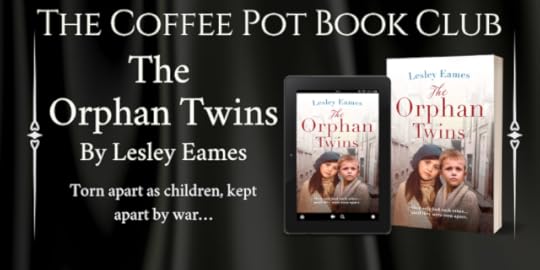
The Orphan Twins
By Lesley Eames
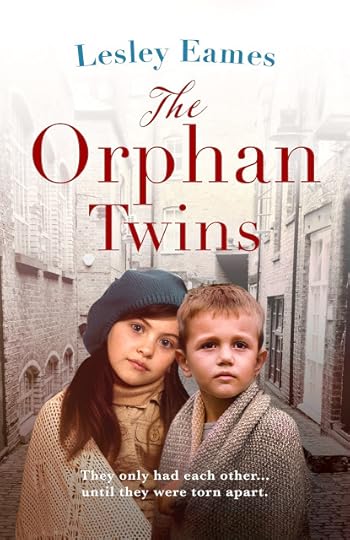
Torn apart as children, kept apart by war…
London 1910. When the death of their beloved grandmother leaves orphan twins Lily and Artie alone in the backstreets of Bermondsey they’ve never needed each other more. But fate offers a privileged life to one and only poverty to the other. Growing up apart in such different circumstances, can they ever be truly together again, especially after war explodes across the world and romance beckons?
Excerpt
January 1910
Lily entered the yard from the alley that ran behind the shabby little terraced house that was home. Seeing Gran at the kitchen window, she raised a hand in a wave only to realise that Gran was hunched over the sink in what looked very much like pain, her eyes screwed shut and her lips clamped tightly together.
Lily’s steps came to a halt as she was torn between rushing to darling Gran’s aid and allowing Gran her pride because Maggie Tomkins would hate to be caught out in what she was likely to consider weakness. Standing watching for a moment, Lily hoped Gran had simply stubbed her toe or received a minor burn from a hot iron. Despite that hope, the memory of Mum doubled up and coughing blood caused a chill to rise up Lily’s spine.
‘Cor, Lil! Dunno where it came from but it was a whopper!’ Artie burst into the yard behind her, having paused to inspect a caterpillar he’d noticed in the alley.
The noise roused Gran who looked up and straightened with a guilty air as though she’d been caught out in wrongdoing. Always hungry, Artie rushed into the kitchen for his dinner. Lily followed, but slowly. Thoughtfully.
‘Are you home for your dinners already?’ Gran said, wiping sweat from her forehead. ‘I wouldn’t have stood idle if I’d realised the time. But it’s hot in here with all this ironing and there’s only so much heat a body can take before she needs to catch her breath.’
She waved round the room at all the shirts she’d ironed. Two irons sat in the hearth warming up for the next lot.
Had she really only been catching her breath? Being a washerwoman was certainly back-breaking work. But Gran was pale instead of flushed and could easily have opened the door or window to let in a blast of freezing winter air if she’d needed to cool down.
Lily looked back at the shirts and wondered if there were actually fewer of them than normal. If Gran was ill, it stood to reason that she’d be unable to work as hard.
‘Let’s get some food inside you,’ Gran said.
‘I’ll fetch it,’ Lily offered quickly. ‘You put your feet up.’
‘Put my feet up when there’s work wants doing?’ Gran laughed, but Lily persisted.
‘Just for a minute or two. I’ve been sitting down at school all morning. I need to move around.’
‘Maybe I will sit down,’ Gran finally conceded. ‘But not for long.’
To Lily’s relief, Gran pulled out a chair that was tucked under the small kitchen table and sat. Lily moved to the cupboard where food was kept along with plates, cups and cutlery. Inside she found a loaf on a wooden board which she carried to the table together with a knife before returning to the cupboard in search of something to put on the bread.
Artie loved the meat paste that came in round white pots but it had been a long time since they’d had any of that. Sometimes there was cheese but not today. There was butter but not much of it so Lily reached for the jam pot instead. Gran had made the jam from the blackberries Lily and Artie had gathered from any stray bush they’d been able to find in the autumn months but the jar was already half-empty and there weren’t any more. Less work meant less money coming in, of course, and that meant emptier cupboards.
Gran had been ill only twice before as far as Lily could remember. The first time, they’d all had upset stomachs and spent the day dashing outside to the privy. Gran had blamed a piece of mutton she’d cooked in a stew. ‘I’ll give that butcher a piece of my mind,’ she’d threatened, and as soon as she was well enough she’d marched into his shop to tell him what had happened.
‘’Course that mutton was off,’ she’d insisted when he’d argued. ‘You must have let it sit in the window too long.’
‘I didn’t!’
Gran had simply crossed her arms and waited.
‘Look, I’m not saying you’re right,’ the butcher had finally said, looking round at his other customers as though fearing they might take themselves and their custom elsewhere. ‘But I can see you’re out of sorts so, just to show I’m a man who likes to help his customers, I’ll make you a gift of a nice string of sausages.’
‘I’ll take some bacon too,’ Gran told him. ‘And the same again next week.’
Gran was afraid of no one but there’d been no free sausages or bacon the second time she’d been ill because there’d been no one to blame for her bad chest. The only wonder was that her chest hadn’t been bad more often considering they lived in a house that spent its days filled with steam and its evenings with the steam turning to drips downs walls and windows. Sometimes the drips turned to ice.
Lily decided to say nothing of her suspicions for the moment, seeing as Gran obviously didn’t want to worry them. Lily didn’t want Artie worried either. But she’d watch Gran carefully from now on and help as much as she could.
She cut a thick slice of bread for Artie as he was always so hungry. ‘Gran?’ Lily invited.
‘I’ll have mine later.’
Would she, though? Probably not, if food was in short supply. Lily was tempted to go without eating too but Gran would know then that she’d given the game away about being unwell. Her pride would be hurt as Gran liked her grandchildren to be both well-fed and well-shod. No running around in bare feet in all weathers for them. Artie would realise something was wrong as well. Reluctantly Lily cut a slice of bread for herself but made it a thin one. She spread jam liberally on Artie’s slice but added little more than a dab to her own.
She picked her slice up quickly to hide the lack of jam but Artie had already noticed. ‘I’ve got more jam than you,’ he pointed out. He was a sweet boy who liked to be fair.
‘You’ve got more growing to do,’ Lily told him, hoping a little good-natured teasing would distract him from the jam before Gran noticed it too.
Artie pulled a face. It was a sore point with him that Lily should be just thirty minutes older yet a whole two inches taller. ‘You a girl and all,’ he often complained.
Lily took after their father and Gran, being straight and slender with the near-black hair and blue eyes common among people from the Irish homeland Gran had left as a child – though Gran’s hair was white all over now. Artie was more like their gentle mother – small and soft with honey-coloured eyes and toffee-coloured hair.
‘Just wait until we’re eleven,’ Artie said now. ‘I’ll catch you up and leave you behind.’
‘We’ll see,’ Lily said, smiling, and she was glad to see Artie tuck into his bread with every sign of having forgotten his extra jam. ‘School was good this morning,’ she said, changing the subject before he remembered it. ‘Miss Fielding said she was pleased with my handwriting.’
‘You always write a nice hand,’ Gran said.
‘Davie was sick in my class.’ Artie grinned.
Lily looked at Gran and they both rolled their eyes. Boys laughed at the oddest things. ‘Poor Davie,’ Gran said.
‘He said he felt better afterwards. I think he did it on purpose because Mr Simpson has new shoes and—’
‘I think we’ve heard enough of Davie,’ Gran said. ‘You’ll put us off our dinners.’
Talk of Davie’s indisposition hadn’t put Artie off his dinner. He crammed his bread into his mouth and ate it hungrily. Lily ate hers more slowly then lifted the kettle onto the fire to save the cost of lighting the gas on the stove. It was a rare day when there wasn’t a fire in the kitchen hearth. Gran boiled most of the washing water on the stove in the big copper but the fire was used for extra water as well as for heating the irons and drying the washing, especially at this time of year when it could hang on the lines in the yard all day and still come in damp.
Gran looked out of the window where sheets billowed on the washing line like sails. ‘I’d better fetch that lot in,’ she said, hands flat to the table as she levered herself out of her chair.
To Lily’s eyes it seemed to require more effort than usual. Lily waited until Gran was outside then got up to return the loaf and jam to the cupboard. With her back to Artie so he couldn’t see what she was doing, she reached for the old tea caddy in which Gran kept their money. It felt worryingly light.
Replacing it, Lily took out cups and a small jug of milk. The rest of the milk was kept in the front parlour where it was cooler. They used their tea leaves three times before they gave them to Harold Finnegan on Grace Street to use on his allotment in return for occasional vegetables or rhubarb. It was a day for new leaves but Lily used the old ones again. There wasn’t much life left in them but hopefully Gran wouldn’t notice the tea was weak.
‘Any buttons to sew back on?’ Lily asked, as Gran returned with her arms full of washing.
Gran’s sight wasn’t what it had once been so sewing was a job Lily took on gladly.
‘A few. There’s a fallen hem that needs mending too.’
Artie drank his tea then wandered back outside to see if any of his friends were playing in the alley. Lily set to work with the sewing, glancing in Gran’s direction occasionally and noting the lines that cut crevasses into the ageing face. Gran was definitely under the weather but everyone felt under the weather sometimes and usually they got well again.
Not always, though. Dad had dropped dead unexpectedly due to a sudden bleed on his brain. Within a year Ma had fallen ill. Tuberculosis, the doctor had called it, though everyone else had called it consumption. Arrangements had been made for her to go to a sanatorium at the seaside where the air was cleaner but she’d been taken off by pneumonia before she could get there.
The cold lick of dread was back in Lily’s stomach. ‘Why don’t I stay at home this afternoon and help with the laundry?’ she offered.
‘And miss school? You’ll have one of those inspectors down on me for keeping you away from your book learning.’
‘We aren’t doing book learning this afternoon.’ More was the pity because Lily loved it. ‘We’re doing sewing and you’ve taught me all I need to know about that.’
‘You’re a quick one, that’s for sure. Your dad always said so.’
Lily remembered overhearing Dad saying exactly that and adding, ‘I wish Artie were half as quick. It doesn’t seem fair that a girl should have more brains than a boy when it’s Artie who’ll have to put food on the table when he’s older.’
Gran had pointed out that, as a widow, she’d been putting food on her own table for years as did countless other woman.
Pick up your copy of
The Orphan Twins
Add The Orphan Twins to your ‘to-read’ list on

Lesley Eames

Lesley has worked as a solicitor, event organiser and Marketing and Fundraising Development Manager for a charity but writing has been her passion since childhood.
Her first published stories were written for the women’s magazine market and she is now the author of three historical novels covering the years 1910 to the Roaring 20s. Having won the Romantic Novelists’ Association’s Elizabeth Goudge Cup and the Festival of Romance’s New Talent Award, she was delighted when both of her first two books were shortlisted in the UK Romantic Novel Awards.
In addition to her own writing, Lesley is a creative writing tutor, mentor and editor. She lives in Hertfordshire where she loves spending time with family and friends while also dreaming up more fictional characters.
Connect with Lesley:
Have a sneak-peek between the covers of Carol Hedges' fabulous book Fame and Fortune (The Victorian Detectives Book 8) #HistoricalFiction #VictorianMystery @carolJhedges
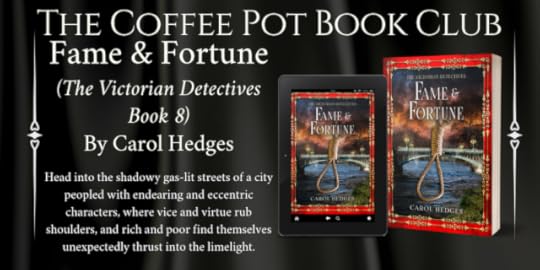
Fame & Fortune
(The Victorian Detectives Book 8)
By Carol Hedges
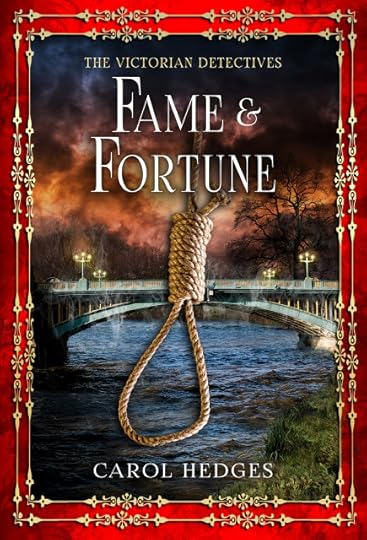
London, 1867.
When the body of a man is discovered hanging from a Thames bridge, Detectives Greig and Cully, two of Scotland Yard's finest crime-solvers, are called in to investigate the mysterious circumstances of his death. Their inquiry will lead them into a world of extortion, robbery and human trafficking, and at its centre, the Black brothers, Munro and Herbert, London's most evil and ruthless individuals, who will stop at nothing to keep their position at the top of London's criminal underworld.
The eighth outing for the Victorian Detectives entices the reader once more along the shadowy gas-lit streets of a city peopled with endearing and eccentric characters, where vice and virtue rub shoulders, and rich and poor find themselves unexpectedly thrust into the limelight.
Excerpt
London, 1867. It is midnight, and a cold, damp autumn wind is sulking around the brick chimneypots. Above, the star-studded sky is barely visible beyond the yellow flicker of gas lamps. A man stumbles along one of the streets leading down to the river. He is being supported by two other men, who hold him firmly by his arms. To the night-constables, sheltering in a doorway and sharing a smoke, it looks as if he has had too much to drink, and is being escorted home by a couple of companions, or perhaps some drinking associates.
This is not what is happening.
The man experiences a sense of unreality. He cannot feel his feet, nor the pavement beneath them. He doesn’t struggle or try to escape. He is a survivor, so he guesses that something has been put in his drink earlier in the evening to render him docile and compliant. Mind, he does not remember much of what happened earlier, but he knows with the part of his brain that is still functioning, that this is going to end very badly. The two men stop. A blindfold is placed around his eyes. They walk on. Then stop once more.
The air feels different now, closer, denser. He has the sensation of standing beneath some sort of big overarching structure. A bridge? He is propelled forward. He hears carriage wheels and the clip-clop of hooves passing overhead. He hears water lapping against wooden stanchions close by.
These will be the last things that he hears.
A few hours later, a group of returning revellers will stagger home along the riverside path. They will pass under the bridge, where they will see what looks like a strange shape swinging from a length of rope. It is only when one of the revellers, egged on by his friends, climbs the wooden scaffolding that has been erected as part of the bridge’s renovations, that it becomes suddenly and horrifyingly clear exactly what the swinging shape is.
****
The morning starts off drizzly, but as Detective Inspector Lachlan Greig and the officers carrying a stretcher make their way to the foot of the bridge, it brightens, so that by the time they get there, a pale wash of sunlight lies over the river, turning it into lemon-coloured slices.
The body lies on the path, just below the bridge. A couple of constables are engaged in holding back the gawping spectators. A third stands guard over the body. A line of onlookers leans over the bridge. There is a murmur of anticipation as the tall broad-shouldered detective and his men arrive on the scene. The body guard hurries towards them, a self-important expression on his face.
“We took the liberty of cutting him down,” he says, indicating the body, which is covered in a large sack. “Don’t want to alarm the ladies.”
Judging by the faces of the crowd, alarm is the last thing they are worried about. Greig stares down at the sack. He reads the words Art. Dollimore, Coal Merchant Suppliers, London City Wharf. Business & Domestic. The sack appears to be brand new. The top of a man’s head can just be seen protruding. He finds himself mesmerised by the words. Where on earth did they find a brand new coal sack at short notice?
“What can you tell me?” he asks, getting out his notebook.
“Suicide,” the constable says with a knowing air. “I warned them at the time: unattended scaffolding like this is an open invitation, I said. Should have put a guard on it, I said. Or some lights. And now look what’s happened,” he gestures towards the sack. “A man in the prime of life climbs up the scaffolding and throws himself off. Somebody’s going to have to answer for it, you mark my words, sir.”
Detective Inspector Greig motions to his men to transfer the body to the stretcher. The crowd on the bridge leans over to better see what is happening. Their expressions are eagerly hopeful. It reminds Greig of a picture he once saw of the crowd at a Roman gladiatorial contest. He hears the usual shouts of ‘Was it the Fenians?’ He ignores them.
“Can you show me exactly where the body was found?” he requests.
The constable leads him to the mouth of the archway and points upwards. “Just there. A-hanging from the top scaffolding pole. Group of men coming back from the King’s Head spotted him,” he says, folding his arms. “Soon as we were alerted, we rushed straight here. I made an assessment of the situation and had the body cut down. I checked his pockets, but there was nothing there ~ see, that’s a sure sign he wasn’t intending to go home. Suicide, like I said.”
His air of self-importance is grating. Greig tries to focus on the facts rather than the interpretation he is being offered. He is not buying the suicide theory. There are easier and far more effective ways to do away with oneself than climbing up rickety scaffolding on a dark night, attaching the end of a rope to a slippery pole and jumping, he thinks. And as for the lack of personal possessions, that could mean anything. He sometimes left his lodgings with nothing more than the price of a drink in his pocket.
He studies the ground. It is a blur of muddy footprints. Unfortunately, the constable, in making a decision way above his pay grade or intellectual ability, has now effectively eliminated any prints that might have provided a clue as to how this man really met his end.
“You writing all this down?” the self-designated expert inquires. “Will you be wanting me to submit a report to Scotland Yard?”
Greig indicates that this will not be necessary, as he believes he has mastered the salient points of the matter. The constable looks disappointed. Greig nods his unfelt thanks, and prepares to follow his men back to Scotland Yard. The sun has now disappeared behind a cloud, leaving the customary smell of decay and rot. A sailing barge is making its way upriver. In its wake, gulls swoop and cry. Greig recalls that they are supposed to contain the souls of the dead. A melancholy thought. It stays with him on the return journey.
Pick up your copy of
Fame & Fortune
Add Fame & Fortune to your ‘to-read’ list on

Carol Hedges

Carol Hedges is the successful UK writer of 18 books for Teenagers/Young Adults and Adults. Her writing has received much critical acclaim, and her novel Jigsaw was long-listed for the Carnegie Medal. Her YA ebook Jigsaw Pieces, which deals unflinchingly with many of the problems that beset today's teens, is available on Amazon as is her YA Dystopic Fantasy The Last Virus.
Carol is also the writer of 'The Victorian Detectives' ~ a series of adult historical novels set in 1860s London and featuring Detective Inspector Leo Stride and his side-kick Detective Sergeant Jack Cully.
The eight books in the series are:
Diamonds & Dust
Honour & Obey
Death & Dominion
Rack & Ruin
Wonders & Wickedness
Fear & Phantoms
Intrigue & Infamy
Fame & Fortune
Carol Hedges lives in Hertfordshire with a tortie-siamese cat called Halley and a lot of pond fish. When not writing/sleeping/trying to resist cake, she tutors A level and GCSE English Literature. She campaigns as chair of a local action group to save a community urban green space from possible development. She also minds her two grandchildren, one of whom is the star of the Award Winning series of blogs: The Adventures of L-Plate Gran.
Connect with Carol:
August 28, 2020
Roberta Kagan is sharing an excerpt from her fabulous book — The Smallest Crack #mustread #HistoricalFiction #TheSmallestCrack @RobertaKagan

The Smallest Crack
By Roberta Kagan

1933 Berlin, Germany.
The son of a rebbe, Eli Kaetzel, and his beautiful but timid wife, Rebecca, find themselves in danger as Hitler rises to power. Eli knows that their only chance for survival may lie in the hands of Gretchen, a spirited Aryan girl. However, the forbidden and dangerous friendship between Eli and Gretchen has been a secret until now. Because, for Eli, if it is discovered that he has been keeping company with a woman other than his wife it will bring shame to him and his family. For Gretchen her friendship with a Jew is forbidden by law and could cost her, her life.
Excerpt
It had been over a week since Gretchen last saw Norbert. Ever since they first met, he came to her house after work at least three times a week. She tried to attribute his absence to his being busy helping his father open another beer garden. Norbert was good with a hammer and nail, so perhaps his father was working him hard. She wanted to believe that, but she knew something was wrong. She assumed that it was her father’s trouble with the law. Norbert’s family earned a nice living from the SS officers and Gestapo agents. Their popularity among the party members had given Norbert’s family enough extra cash to open another location. To make matters worse, since Gretchen and Norbert got engaged, she hadn’t taken the time to tend her friendship with Hilde. So now, when she needed someone to talk to, she didn’t feel comfortable going to Hilde. When Hilde first returned from the Bund camp, she told Gretchen how upset she was that Hann had moved away. Gretchen had tried to be caring and sensitive, but it was impossible. She was too excited about her upcoming wedding, and she found herself talking about her own plans. After that, Hilde stopped coming to see her. When they passed each other at work, Hilde was polite but not as friendly as she’d been. It bothered Gretchen, but at the time, she’d been so caught up in the idea of getting married that she had not paid much attention to Hilde. Now she wished she had. Hilde was not perfect, by any means, but she and Gretchen were once close enough to talk about anything. And now, Gretchen had no one she felt she could turn to.
…The truth of the matter was that once she was engaged, Norbert became her best friend. He monopolized all of her time. And somehow, she hadn’t minded at all. There was the excitement of discovering sex for the first time, followed by the thrill of having a real boyfriend, a fiancée. Then there were all the wonderful plans for the wedding. She’d been swept away by the newness of it all. If she really thought things through, she knew that Norbert was wrong for her. She always knew. And she had never really loved him. Not really. Perhaps it was because he was nothing like Eli. But why was she thinking about Eli now?
Pick you your copy of
The Smallest Crack
Roberta Kagan

I am an USA Today Best Selling Author of Historical Jewish Fiction mainly set during World War 2. My father was Romany and my mother was Jewish, When I was very young I learned about the Holocaust. I couldn't understand how something like this could happen. So, I began to research and learn more. I met with survivors. I even met with children and grandchildren of SS officers. But I still had no answers. I cannot say that I have all of the answers to all of my questions even now. But what I do know is that soon all of the survivors will be gone. Their message must be remembered, the sacrifices that they made must not be forgotten. And so I humbly and with the utmost humility I try to tell their stories. It is painful, but I must convey the darkness and horror of the time, However, I also want the world to know and celebrate the unsung heroes. Because there were many ordinary people who acted in heroic ways. I realize that writing these books is a great responsibility. I pray every day that I am able to do this correctly. I am trying to reach out and touch many people, not with the message of the horrors but with the promise of hope. I thank you from the bottom of my heart for considering my work. It is an honor that I never take lightly.
Connect with Roberta:
Website • Twitter • Instagram • Facebook • Facebook Author Page • Roberta Kagan Book Club

August 27, 2020
Stuart Rudge is sharing an excerpt from his fabulous #NewRelease — Blood Feud (Legend of the Cid Book 2) #HistoricalFiction @stu_rudge

Blood Feud
(Legend of the Cid Book 2)
By Stuart Rudge
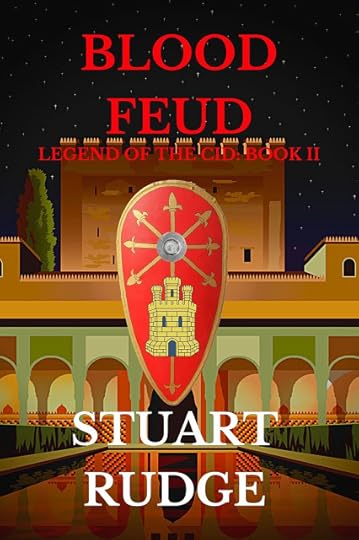
Castile. 1067AD.
The clouds of war gather over Hispania, and Antonio Perez continues on his path to knighthood, under the watchful eye of his lord, Rodrigo Diaz de Vivar. A peculiar invitation sees Antonio and Arias in the den of their nemesis, Azarola, where they discover the truth of his marriage to Beatriz, Arias’s sister, and the years of suffering he has inflicted upon her. Arias vows to deliver Beatriz from the clutches of Azarola and restore his family’s honour – even if it means betraying Rodrigo, defying his king and threatening the future of his country.
Fresh from his victory over Navarre and Aragon, King Sancho of Castile sends his revered champion Rodrigo to Saraqusta, to treat with amir al-Muqtadir. His mission is to secure an increase to the parias tribute from the Moors and hasten preparations for a war with Leon. But an unknown evil stirs in the shadows of the city which, if allowed to fester, not only threatens Saraqusta itself, but the entire political harmony of Northern Hispania. It is up to Rodrigo and Antonio to root out the conspiracy before it is too late.
Blood Feud is the stunning second instalment of Legend of the Cid.
Excerpt
There was so much death that day, but one more had to die.
The sporadic cries of dying soldiers pierced the silence. The northern wind blew the stench of blood and human waste from voided bowels our way, and caused some to gag and baulk, though they did their best to retain their composure. The afternoon sun beat down upon us and the sweat drenched our already sodden brows and bodies under the weight of our armour. The bitter taste of it lingered on my parched tongue. A battle line of battered shields stared us down; the men who wielded them were worn and weary from hours of fighting, yet defiant all the same. The Navarrese valiantly defended their homeland, and they would not be dislodged so easily by the brave knights of Castile.
In the centre of the field, away from the corpses that littered the ground, stood two men; a champion nominated by each king to fight to the death and bring a resolution to the stalemate. The Navarrese champion was a knight named Jimeno Garces, and we only knew his name because he paraded himself before us and declared his identity with a promise to rape the wives of every Castilian man upon his victory. His vibrant mail coat was already splashed with crimson blood, yet the gleaming sword in his right hand had been wiped clean so the sun shone bright on the polished steel. He paced the ground with a small round shield in his other hand, stared at the man before him.
Our own champion was my lord, Rodrigo Diaz de Vivar.
He stood calm and composed like a sentinel, studied Jimeno’s demeanour. The polished mail on his powerful frame was sullied by dust and grime, for he had been in the thickest of the fighting, led the charge to shatter the Navarrese lines with the banner of Castile in hand. But the enemy had held firm, and now upon his shoulders was the burden of ending the battle, and even the war.
I was born Antonio Perez de Lugones, but my father Pedro had died three years previous and Lugones was no longer my home, so that name was lost to me. In the year 1067 I was known as Antonio Perez de Vivar, and I was a squire to Arias Benitez, the castellan of Vivar. We had been called to war by King Sancho of Castile and we now stood before the walls of Viana, a town on the Navarrese side of the Ebro, where a bloody battle had been contested. We had already been routed from the same battleground the year before, but now Sancho had returned and vowed to claim a victory, no matter the cost in blood.
In the vicious battle, knights had charged as javelins, arrows and quarrels flew, and blood coated the ground as spears skewered and swords and axes rose and fell. The men of Castile had attacked and been repulsed, and the Navarrese had launched their own counters and been resisted. In the early afternoon, with the battle on a knife-edge and during a lull in the fighting, King Sancho of Castile had ridden out alone to the centre of the field to compel his counterpart to surrender. Sancho of Navarre had met him there. He knew his subjects were depleted whilst the men of Castile were still eager to fight, and so between them the kings decided to stake the conflict on a single combat, champion against champion, to determine who would carry the day. The Navarrese knew they were beaten, but their king wanted to retain a scrap of honour before he knelt to son of the great Fernando of Leon-Castile.
Jimeno turned his jeers towards Rodrigo. Still my lord did nothing, uttered not a word.
‘Why does he not attack?’ I asked.
‘Because Rodrigo is not a fool unlike Jimeno. Just wait.’
Arias was sat astride his great black warhorse, Spartan, and I stood at his side with his helm and spear in my grasp. A surgeon tended to a nasty gash along his right forearm, stitched the wound closed with a thin bone needle and a length of catgut. A Navarrese sword had cut across the unprotected forearm before Arias could neutralise his opponent. He winced time and again as the needle passed through his flesh, but he kept his focus on the two champions. So did the rest of our army. We were eager for the blood of Jimeno Garces to be spilt.
Jimeno bellowed and launched himself at Rodrigo.
The first clash of steel brought a clamour of noise from both battle lines as they spurred on their respective champion. Jimeno thrust forward, an attack aimed to test Rodrigo, yet our champion flicked his wrist and parried with ease before he sliced Jimeno’s thigh. It was nothing but a flesh wound, yet it checked Jimeno’s confidence and made him grit his teeth. He spun and stalked Rodrigo as his bravado waned. He hesitated, lunged again, but Rodrigo side stepped and thrust the pommel of his sword in to the side of Jimeno’s helm. This time the Navarrese champion stumbled forward, dazed from the blow. When he recovered and composed himself, he was cautious. The fire in his belly had seemingly diminished. Rodrigo continued to watch, did not move, a gesture which unnerved Jimeno. He had underestimated his foe, and now it was Rodrigo who taunted with silent bravado.
The Castilian thrust forward with frightening speed. His blade scraped along the links of his adversary’s mail coat, made Jimeno jump back as he brought his shield up to block the next attack. Even as his sword was deflected Rodrigo had twisted his arm and brought the blade from high, then from his left and right. His tirade astonished Jimeno, who barely defended the blows and bared his teeth in panic.
I looked to the side and saw our king sat resplendent upon his horse; an elaborate and polished helm sat on his head, a blood red cloak was draped over his broad shoulders and his gleaming mail was tight against his powerful frame. A grin curled upon his lips. Victory was assured, and Rodrigo would soon finish his opponent. Upon his coronation Sancho had chosen Rodrigo to be his alferez, the commander of the armies of Castile. Despite his young age he was Sancho’s revered champion, who would fight for him whenever he was called upon. No man in Castile could match him for his sword work and, as it would seem, neither could any man in Navarre.
It was no longer a contest. We all knew the outcome. Rodrigo attacked time and again, played with his foe. The way he moved was fluid, flawless, as he drew blood from precise cuts to the sword arm, then the left thigh and along Jimeno’s unprotected neck. Jimeno managed to launch a handful of counters but Rodrigo parried them with ease and drove his opponent further back, and with each fresh cut Jimeno’s resistance waned. Then Rodrigo got behind his foe, spun, and slashed his sword along Jimeno’s calf, brought him to his knees with a great howl. Rodrigo retreated and stalked in a circle. Jimeno leant on his sword to haul himself up, but Rodrigo’s blade had cut through his hamstring, rendered the leg useless. The contest was over.
Jimeno’s shoulders sagged as he released the sword and shield from his grasp and removed his helm to reveal a weather-beaten face, his raven hair slick with sweat. He closed his eyes and tilted his head to the sky. A silence descended, save for Jimeno’s muttering. He opened his eyes and said something to Rodrigo, and our champion’s reply was, strangely, met with light-hearted laughter from the pair. But the grim mood returned when Rodrigo laid the edge of his blade across Jimeno’s throat, said something inaudible and slashed hard and quick. A sickening gurgle escaped the defeated foe’s throat as the blood gushed like wine from a barrel, stained the front of his mail coat. His body twitched as he clung to his last breath before it became limp, and flopped to the dusty ground. Jimeno’s corpse was added to the multitude of dead already strewn along the ground.
A surge of noise erupted from our lines. Every Castilian beat his weapon against his shield and roared in triumph, and soon the steady chant of ‘Campeador! Campeador!’ reverberated over the battlefield. The Navarrese stood motionless, dishevelled. Their resolve gushed away akin to the way the blood seeped from their champion’s neck.
A solitary figure rode forth from the enemy lines and came to a stop near Jimeno’s lifeless body. Rodrigo gave the man a curt bow as Sancho rode forth and met him.
‘The battle is over,’ our king called, ‘unless you can muster another one of your sorry wretches to die on my campeador’s blade?’
Sancho’s counterpart removed his ornate helm to reveal a young face now worn from the rigours of combat, tired of so much fighting, like many of the men who stood on the field. ‘No, it is over,’ he replied solemnly. King Sancho of Navarre looked a broken man, sapped of the will to fight. Our king looked as though he could fight a war all over again.
‘Tell your men to lay down their arms, open the gates of Viana and let us negotiate the terms of your surrender. I will allow you to collect your dead first. There are many of them to bury, after all.’
The Navarrese king twisted his mouth in fury but, seeing there was no alternative, he nodded his head and led his horse back to his deflated lines. As he addressed his men in a sombre tone Sancho turned to us with a proud grin on his face.
‘The war is over. This victory heralds a new age of Castilian dominance. God smiles on our endeavours. Soon, all of Hispania will fear the wrath of Castile!’
Raucous cheers greeted the king’s words.
The War of the Sanchos was over, and Castile had won.
Pick up your copy of
Blood Feud
Add Blood Feud to your ‘to-read’ list on

Stuart Rudge

Stuart Rudge was born and raised in Middlesbrough, where he still lives. His love of history came from his father and uncle, both avid readers of history, and his love of table top war gaming and strategy video games. He studied Ancient History and Archaeology at Newcastle University, and has spent his fair share of time in muddy trenches, digging up treasure at Bamburgh Castle.
He has worked in the retail sector and volunteered in museums, before working in York Minster, which he considered the perfect office. His love of writing blossomed within the historic walls, and he knew there were stories within which had to be told. Despite a move in to the shipping and logistics sector (a far cry to what he hoped to ever do), his love of writing has only grown stronger.
Rise of a Champion and Blood Feud are the first two instalments of the Legend of the Cid series. He hopes to establish himself as a household name in the mound of Bernard Cornwell, Giles Kristian, Ben Kane and Matthew Harffy, amongst a host of his favourite writers.
Connect with Stuart:
Publication Date: 19th August 2020
Publisher: Independently Published
Page Length (paperback): 356 pages
Genre: Historical Fiction
Check out T.J. London's fabulous book — Man of War: The Rebels and Redcoats Saga Book #4, Prequel #HistoricalFiction #American @TJLondonauthor

Man of War
The Rebels and Redcoats Saga Book #4, Prequel
By T.J. London

The man who wants everything gets nothing…
July 1755
War is brewing between England and France. Impressed into the Royal Navy, Lieutenant Merrick, against all odds, advanced through the ranks to become an officer—but he is not a gentleman. A man with a tainted past from a traitorous family, cast down by King George—a stain no man can remove.
Merrick’s thrust into the role of captain, when the HMS Boudica is attacked by pirates off the coast of Nova Scotia. On a captured enemy vessel he discovers a King’s ransom in treasure and a woman chained in the hold from passenger ship that mysteriously disappeared at sea.
Beautiful, defiant, and hell bent on revenge, India makes a deal with Merrick to uncover the pirates’ scheme, promising him everything he desires: fortune, glory, and the chance to bring honor back to the McKesson name.
Now, they race against time to uncover a plot that links those in the highest ranks of the British aristocracy, to a failed rebellion that is once again trying to topple the monarchy and place an old pretender on the throne. But all that glitters is not gold as passions stir and an impossible love blooms, threatening to undermine all Merrick and India have done to protect their King and a country on the brink of war.
***This book contains graphic content and depictions of war***
Excerpt
“Captain, quick! There’s a woman trapped down here! She’s chained to the wall. We need something to get her out. Look for keys or something to break a lock.”
Merrick took a deep breath and thrust a shaking hand through his hair. They were fast running out of time. Turning in a circle to the right, he searched the deck; all around him there were six-pounders lashed to the walls, rammers, worming irons, linstocks, but nothing he could use to pick a lock. Damn.
“Hang on!” he yelled.
The galley. Merrick rushed around the companionway and through the archway into the kitchen, and then he got down on his knees and dug through the mess of utensils lying on the floor. He managed to find a butter knife and a large, cast-iron poker. It would have to do.
The Culloden creaked, the wood protesting the weight of water straining the hull, threatening to render the ship in two. He grabbed a rammer from the deck head above and made for the hatch that led down to the hold.
“Sykes!” Against the larboard hull, he could see the flicker of a lantern, the loud grating of metal rubbing against metal reverberating back at him. The woman’s head was all that was visible above the water, her chin thrust up, trying to keep from submerging completely. When he reached the bottom of the stairs, the water was already above his hips, the skirts of his tunic feeling heavy as they saturated and clung to his legs.
“Captain, help me.”
The woman’s wrists were in irons and chained to the hull above her head. Sykes was using the hilt end of his cutlass to pound the metal fastener, leaving behind little nicks but doing nothing substantial.
“Here, let me.” Merrick took the blunt end of the rammer to the iron ring several times, using every bit of strength he possessed. The woman squeezed her eyes shut, but she didn’t yell or scream; it was as if she had unyielding faith they would free her, though Merrick wasn’t so sure.
He pounded away at the lock—once, twice, three times—but she kept her eyes closed, never once looking up, only flinching with each blow of the rammer against the metal.
“I’ll get you free. Just hang on.” Merrick said that more for his benefit than hers.
As he went for the lock again, he stopped with his hands in mid-thrust, arrested by the most exquisite aquamarine eyes he’d ever seen. Their color was so brilliant and blue that even in candlelight they rivaled Caribbean waters after a summer storm. She was cloaked in darkness, but he could tell the woman had fair, porcelain skin and delicate, high cheekbones, though the left side of her face was smeared with a thick layer of sludge and dirt that stretched from the corner of her eye to her lips like a half mask.
His heart took off in a sprint, an instant connection forged between himself and the mysterious, unfortunate woman at his mercy. He felt rather like a romantic hero, or a knight on a white horse come to the rescue, and she the damsel in distress. If he could get the damned shackles to open, he could see their fairy tale to completion. “These irons are a pain in my arse.”
Not the most gallant first words to his lady fair, but there was no time for propriety. “Just hold on, miss. Don’t be afraid.”
Not much better.
She nodded then closed her eyes, water rushing up, submerging her chin and filling her mouth.
“Mr. Sykes, hold on to her.”
When she came up in the lieutenant’s arms, she coughed, gagging on water and thick, putrid bilge sludge. When Merrick looked into her beautiful eyes again, the fear he saw gave him the strength of ten men drawing up the Boudica’s anchor through mud with an old, moldy capstan.
Pulling back, he rammed the shackles several times, expelling his pent-up angst into the metal until it finally succumbed to his will and bent. “I think I’ve got it!” Mustering up a groan from deep in his gut, he thrust the rammer into the irons again; only that time, the ring gave way. The woman let out a gasp a split second before she slipped through Sykes’s arms and submerged into the darkness, her shackled arms weighing her down.
“Captain, she disappeared!”
“I’ll find her.”
Pick up your copy of
Man of War
Add Man of War to your ‘to-read’ list on

T.J. London
T.J. London is a rebel, liberal, lover, fighter, diehard punk, pharmacist, and author who loves history. As a storyteller, her goal is to fill in the gaps about missing history, those little places that are so interesting yet sadly forgotten. Her favorite time period to write is, of course, the American Revolutionary War (is there any other time period?). She also enjoys researching the French Revolution, the French and Indian War, the Russian Revolution, and the Victorian Era. Her passions are traveling, writing, reading, cycling, and sharing a martini (no more wine, I’m a migraineur) with her friends while she collects experiences in this drama called life. She’s a native of Metropolitan Detroit (but secretly dreams of being a Londoner) and resides there with her husband, Fred, and desperately misses her beloved cat and writing partner, Mickey, who passed away just as she finished MOW.
But there is another cat writing partner in her future… and plenty more Revolutionary books!
Connect with T.J. London:
Website • Facebook • Twitter • Goodreads.
USA TODAY bestselling author, Terry Lynn Thomas, is sharing an excerpt from her fabulous book — House of Lies #HistoricalFiction #Mystery @TLThomasBooks
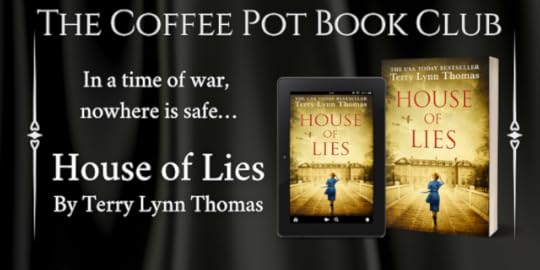
House of Lies
By Terry Lynn Thomas
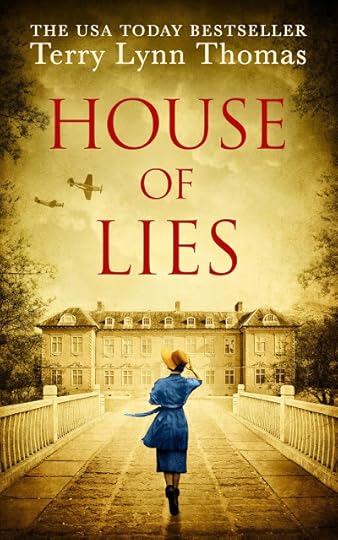
In a time of war, nowhere is safe…
While World War Two rages, Cat Carlisle runs a women’s refuge to protect battered wives. But when one of the women is found dead in the woods behind the house, Cat’s world shatters.
Was the killer a violent husband seeking revenge? A secret lover? Or is something more dangerous at play? Because Cat and her fiancé Thomas have a secret: they’re hiding a precious golden chalice, keeping it locked safely away from the plundering Nazis until the war is over. But someone wants that treasure, and no one will be safe until they get it…
Excerpt
Cat headed out into the morning chill towards the garden shed, her mind worrying over the veracity of Margaret’s story. Donning her gloves, she raked the vegetable bed, mixing in the mulch they had ordered specially. By springtime, the bed would be rich and fertile and ready for the vegetables they started in the greenhouse. As she worked, she thought of her upcoming marriage. Thoughts of Thomas distracted her so thoroughly, she didn’t see the man sneaking out from behind the greenhouse, a shovel slung over one shoulder. Like a perfect predator, he paused for a moment, staying just outside Cat’s line of vision, until she squatted down with her back to him, vulnerable and unable to defend herself.
Cat didn’t sense his presence. Out of the blue, she felt a strong hand on her back, followed by a hard push, which sent her sprawling onto her stomach into the dirt.
Adrenalin coursed through Cat’s body as she landed. She turned on her back and met the eyes of a short, wiry man, with a lined face and angry eyes. He towered above her, brandishing the shovel. By the look on his face, Cat could tell he enjoyed his dominant position. Forcing herself to stay calm, she took a deep breath. ‘Mr Grenville, I presume.’
‘We’re going to have a little talk about my wife,’ Mr Grenville said. ‘Get up.’ He offered Cat his hand.
She ignored it and stood up on her own, grabbing the hand trowel as she did so.
The manoeuvre wasn’t lost on Mr Grenville. He gave Cat a smirk and slung the shovel over his shoulder again.
‘Get off my property,’ Cat said. She was a good three inches taller than Mr Grenville. She bit back her fear, keeping her voice strong. ‘The police are looking for you in connection with a murder. Someone inside the house will see you and call them.’
‘Not true, Mrs Carlisle. You’ve got your housekeeper in there, but she’s weak and old. I’d say that I’m safe from her. Surely you didn’t think I’d approach you without evaluating the situation.’ He stepped closer, once again brandishing the shovel like a weapon in an effort to intimidate. ‘And I didn’t kill that girl.’
Cat took a step closer to him. ‘Get away from me.’
‘You’ve got spunk, I’ll give you that. You just tell me what you’ve done with my wife, and I’ll be on my way.’
‘No. My singular purpose in life is to keep women like your wife away from men like you.’ Cat regretted the taunt immediately as Mr Grenville’s placid, semi-amused look became one of anger. He circled Cat, like a boxer in the ring. Having no choice but to reciprocate, Cat countered his every move. They mimicked each other, like two dancers in a violent tango. Over Mr Grenville’s shoulder, she saw Bede Turner’s startled face in the window.
Please, Bede, get help.
Mr Grenville attempted to step closer to Cat. In perfect pantomime, Cat stepped away. She eyed the house. Could she make a dash for safety?
‘You can’t outrun me, Mrs Carlisle. And I don’t know what my wife told you, but we were happy together. I was good to her.’
Cat laughed. ‘Hardly. She hated you. Couldn’t wait to get away.’ Cat should have noticed the twitch in Michael Grenville’s left eye, the portent of his rage. ‘She’s rather a fine lady. Not surprising considering her wealth. Her wealth, Mr Grenville. Not yours. No, you won’t be finding her. She’s safely tucked away, safe from your influence, enjoying all her lovely money.’
‘She loved me,’ Michael Grenville insisted.
‘You beat her,’ Cat said. ‘I saw the bruises.’
‘Only when she needed it. A man needs to take his woman in hand. Maybe I should give you a beating right now. Teach you a lesson.’ He leered at her. ‘It’d serve you right and ain’t nothing you can do about it.’
Cat knew women often cowered around their aggressive husbands. But she hadn’t flinched when her husband – now long dead, thank the heavens – threatened. Benton had been tall and strong, and every bit as angry as Michael Grenville, but Cat had never backed down. Familiar hot rage ran through her. She stepped close to Michael Grenville and pushed him hard on the shoulders. He didn’t have enough time to react. His eyes opened wide as he stumbled and landed on his backside.
‘Get away from her,’ Bede Turner shouted, as she strode towards them.
Michael Grenville scrambled into a standing position and held up his hands. ‘You’ve won this round, Mrs Carlisle, but I’ll be back. You can be sure of that.’
Pick up your copy of
House of Lies
Add

Terry Lynn Thomas

Terry Lynn Thomas grew up in the San Francisco Bay Area, which explains her love of foggy beaches and Gothic mysteries. Terry Lynn writes the Sarah Bennett Mysteries, set on the California coast during the 1940s, which feature a misunderstood medium in love with a spy.
Connect with Terry:
Website • Twitter • Facebook • Goodreads.
Have a sneak-peek between the covers of Candace Robb's fabulous book — A Choir of Crows (An Owen Archer mystery Book 12) #HistoricalFiction @CandaceMRobb

A Choir of Crows
(An Owen Archer mystery Book 12)
By Candace Robb
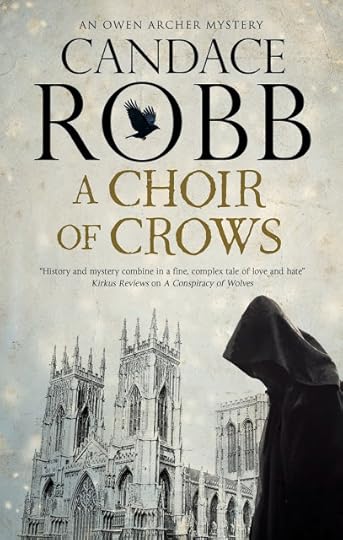
December, 1374.
With the great and the good about to descend on York for the enthronement of Alexander Neville as the new archbishop, the city authorities are in a state of high alert. When two bodies are discovered in the grounds of York Minster, and a flaxen-haired youth with the voice of an angel is found locked in the chapter house, Owen Archer, captain of the city bailiffs, is summoned to investigate.
Tension deepens when an enigmatic figure from Owen’s past arrives in the city. Why has he returned from France after all these years - and what is his connection with the bodies in the minster yard and the fair singer?
Before Owen can make headway in the investigation, a third body is fished out of the river – and the captain finds himself with three mysterious deaths to solve before the all-powerful Neville family arrives in York.
A Raffle Winner and A Choir of Crows
For a fundraising fête for the Medieval Women’s Choir we raffle off the chance to be a character in the next Owen Archer novel… with the best outcome I could imagine. The winner is Marian “Molly” Seibert, our soloist and assistant choir director. Molly has studied and performed medieval music all her adult life, with an exquisite voice that fills a cathedral. We’re both so excited. She’s one of my favorite people I’m one of her favorite writers. I’ve already decided that Molly will be no minor character—I will build the book around her. Her name is even perfect for a medieval woman—Marian!
I ask her for parameters—is she okay with being the murderer? Sure! The victim? Sure! But one request: she once received permission to sing a short piece in the acoustically fabulous York Minster chapter house—could she do that in the book? I promise to make that happen, though I’m already scrambling for how on earth to do that. In the 14th century the chapter house was the meeting place for the minster officials and other cannons, not a public space. It will be a stretch to create a believable scene in which a woman was singing there. Unless, of course, I present it as an event so unexpected that it’s a red flag indicating Something Is Not Right.
And then I proceed to write without any hitches? Alas no, that’s just the beginning. Basing the central character on a friend I greatly admire turns out to be difficult. I keep fighting the plot with the argument—Molly would never do that. Again and again I discard scenes until at last I understand that I need to write down the aspects of Molly I will use for Marian and create a character based on the list, not literally on the original. She must become no longer my friend Molly, but Marian, a woman of the 14th century. Only then can she fully present herself to me and guide me in telling her tale.
Of course there’s much more to the writing of the book—the background regarding music in nunneries, the Neville family politics and hierarchy, the Percy family, Wherwell Abbey, logistics of the minster in that period of time, a clear idea of what a returning character has been doing for a decade, to name the most obvious. But Marian was the key.
Excerpt
They were housed in the undercroft beneath the huge kitchen, sharing the space with casks of wine against the walls and salted meats hanging above them. It had been made clear that should they think to sample the wares, they could forget the generous purse they had been promised. Carl took charge, warning that pilfering would not be tolerated. He was a large man skilled with a knife, and the others, though loudly letting him know the insult cut deep, withdrew to see to their costumes for the morrow. After all, they might well be content with the barrel of ale provided them. And the cold repast. There was no need for his bullying, they muttered amongst themselves.
Ambrose wondered at how little they knew themselves. After a few tankards of ale they would find the stores irresistible. Anyone would.
He chose a corner away from the others, removed the velvet hat, and set it aside with his elegant cloak, letting his long white hair flow free. Placing his crwth on his blankets, he dusted it, then drew out the wax tablet on which he had written the lyrics composed for the occasion. Just the words—the tune was in his head and his fingers. He read it through, then set it aside to tune his instrument.
“Might we rehearse?”
Ambrose thoughtlessly touched the youth’s chin, an affectionate gesture that he immediately regretted as Matthew pulled away.
“Forgive me. I was startled…”
Matthew shook his head. “I should have announced my presence.” Placing a small bench near the blanket, the youth sat down, signaling that no more need be said. Ambrose was trusted.
Blessed be. Sitting cross-legged on the blanket, Ambrose plucked out the primary tune on the crwth. Matthew attended, leaning in toward the sound, nodding, pale face radiant with excitement. Softly vocalizing the notes, then adding more, exploring elaborations, playing with the tune. This was not random play. Every note suited the mode in which Ambrose had composed the piece. Where had the youth learned modes? A religious house? Curious, he tried another tune, in another mode. Frowning, fair hair falling over the pale eyes, and then a smile, and an exploration of notes rising, falling, turning back on themselves—one note out of the new mode quickly corrected with a shake of the head. Ambrose had come to realize the youth’s secret, but was there more, this knowledge, the familiarity with French lyrics? He yearned to ask, but he must say nothing. A conversation might be overheard. Quietly he instructed Matthew in using elaborations only when they enhanced the lyrics. Ah, I see. A lift of the chin, a gesture. That gesture—how was anyone fooled? Yes, Matthew was meant to emphasize the feminine, yet what lad could do it so effortlessly when not performing?
Ambrose had noted an undercurrent amongst the players, a tension. Carl kept a sharp eye out for Matthew. Yes, the man knew. How long could he hold the illusion cast over his players? It was a wonder he’d managed thus far—for Matthew had clearly sung with them a while.
Out of the corner of his eye Ambrose noticed two of their fellows rising, ambling over toward them.
“Once through the song, Matthew,” he said. The lyrics were not as polished as Ambrose would like, but they would do. He counted on the wine flowing at tomorrow’s feast—perfection would be wasted on the mighty. All they wished for were celebrations of the family’s victories, their increasing power.
Matthew sang the tune with a few flourishes enhancing the piece. Perfect recall of the lyrics. Excellent.
“Well done.” Ambrose nodded to Matthew. “Enough for tonight. Now to sleep, and rest your voice.” He nodded to the pair who had come forward. “All our voices.”
“It is a pleasure to sing with you, Master,” said the youth.
“And with you.”
“Did you leave any ale for me?” Matthew asked the two idling nearby.
“Oh aye, and you’ve earned it, pretty lad,” said one. He nodded at Ambrose. “The minstrel’s taken a liking to you. Watch yourself, lad.” Though they were the danger, not Ambrose.
He shook his head as if he could not be bothered with such talk and fussed with his crwth, placing it in a soft case and setting it on his pack, then made as if to go out to relieve himself.
Once outside, seeing no one following, Ambrose doubled back, slipping into a doorway indicated by the kitchen wench who had a weakness for singers. Down the corridor to the curtained alcove, she had said. And there it was. He slipped within and pressed his ear to the boarded-up aperture.
“Ravenser? I do not think you will make much headway with him, Alexander. Thoresby’s nephew—he thought to succeed his uncle. He is not likely to befriend you.”
Ambrose did not recognize the voice. He bent down to a chink in the boards, but the speaker had his back to him. A dark, well-padded jacket embroidered in bright colors, the seams picked out with silver thread.
“Yes, I had heard. My secretary tells me that Ravenser is well thought of amongst the clergy in the city…” Such a nasal quality to the archbishop’s voice. No wonder he railed against his destiny. Was it not enough that his appearance lacked pleasing proportions and grace? He was cursed with beady eyes, a wide nose, and a tiny mouth in a broad, jowly face, his body thick and graceless. He moved with a ponderous, flat-footed gait. An impressive voice might have done much to mitigate such misfortune, especially paired with a composed delivery, as if all the world were his to rule. A good actor might create a powerful illusion. But Alexander Neville had no such talents.
“A word in the right ear…” The mystery man spoke in a soothing tone. Here was one who knew how to shape the air round him. “You know how it is done. Be at ease. We have not brought you so far only to abandon you.”
“Brought me?” A bleat that hurt Ambrose’s ears. What horror to have that amplified in the soaring spaces of York Minster. Pray God the man did not speak above a whisper in that sacred place. And might he never attempt to sing… “Do you insult me?”
A dramatic sigh. “I remind you that you are nothing without the support of the family, Alexander. Nothing.” The voice was cold. “Do not trip over your pride. Our purpose is to unite the North in protecting the realm against all that threatens.”
“You have made yourself plain. But do not forget, I have the ear of the Holy Father.”
“Mark me, he will soon test you, tug on your strings to see whether you dance to his measure. Remember to whom you owe your allegiance—your kin. And King Edward.”
“He is the Holy Father.”
“And he favors the French. Never forget that. Now. What has your secretary learned of the dean of York Minster?”
“Cardinal Grimaud regrets that he is unable to make the journey north in winter. But we met at Westminster. He seems indifferent. A proud, stubborn man …” A petulant sigh. “God save me from these overbearing clerics.”
A startled laugh that the man hardly bothered to mask with a cough. “And the sub-dean acting as dean in his absences? John of York, I believe.”
“Absences? I am not certain the cardinal has ever set foot in the city.”
“You grow tedious. The sub-dean? Dean John?”
A petulant scowl. “A simple mind, easily dominated. You grow tedious as well. I am more concerned about Jehannes, Archdeacon of York. He presents himself as a gentle, unworldly man. But I am warned that one does well not to underestimate him. He sounds a pious bore.”
“And the lay men of influence? This John Gisburne might be of use. Yet having met him—I would prefer a more palatable man in our confidence. He is the sort to make an enemy with each breath. And it appears he considers himself above the law. Someone needs to teach him his place. What did Prince Edward’s man Antony of Egypt think of him?”
“My secretary Leufrid found Antony inscrutable. He was courteous to Gisburne, no more, no less.”
“What of the late John Thoresby’s spy, the one-eyed Welshman?”
“Archer? He’s now captain of bailiffs for the city. And Prince Edward’s man in the city, his eyes and ears in the North, they say. He entertained Antony in his home. Geoffrey Chaucer as well.”
Owen Archer’s position with the prince was precisely why Ambrose had come north.
“I am aware Archer has the favor of the prince’s household. What do we know about him?”
“The city sought his protection. He’s said to be a clever bloodhound, still a fine archer—he was captain of archers for Henry Grosmont before the loss of an eye, then his spy. Grosmont educated him to the latter position before he died. By all accounts he’s Gisburne’s nemesis. At some point the merchant crossed Archer and all the city awaits the day Gisburne is made to pay, and pay dearly.”
“So Archer has enemies.”
“Other than Gisburne?” Ambrose wished he could see black jacket’s face, read the expression that lit up Alexander’s face. “Oh. Yes, I see.”
Ambrose settled himself to hear more. His distasteful interlude with the kitchen wench had been worth it.
Pick up your copy of
A Choir of Crows
Amazon UK • Amazon US • Waterstones • Bookshop
Add A Choir of Crows to your ‘to-read’ list on

Candace Robb

I’m Candace Robb, a writer/historian engaged in creating fiction about the late middle ages with a large cast of characters with whom I enjoy spending my days. Two series, the Owen Archer mysteries and the Kate Clifford mysteries, are set in late medieval York. The Margaret Kerr trilogy is set in early 14th century Scotland, at the beginning of the Wars of Independence. Two standalone novels (published under pseudonym Emma Campion) expand on the lives of two women in the court of King Edward III who have fascinated me ever since I first encountered them in history and fiction.
I am a dreamer. Writing, gardening, walking, dancing, reading, being with friends—there’s always a dreaming element.
Connect with Candace:
Website • Blog • Twitter • Facebook • BookBub.
August 26, 2020
Have a sneak-peek between the covers of M J Porter's fabulous #NewRelease — The Last Horse — England: The First Viking Age (The Ninth Century Book 3) @coloursofunison

The Last Horse
England: The First Viking Age
(The Ninth Century Book 3)
By M J Porter
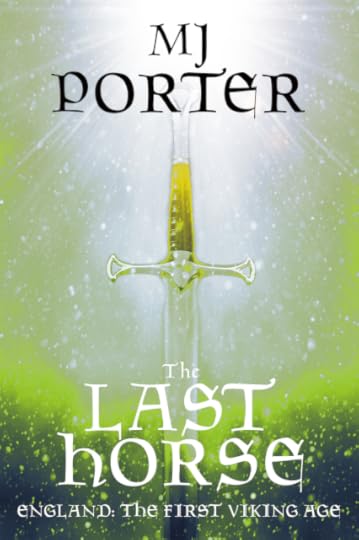
The third book in The Ninth Century Series.
The Raiders have been routed from Torksey, dead, or escaped.
Mercia lies broken but not beaten, her alliance with Wessex in tatters, her new king a warrior not a ruler. And as he endures his coronation, as demanded by the bishops and ealdormen, there are stirrings from the east.
Coelwulf must again take to the trackways of Mercia. His destination, any place where the Raiders are trying to infiltrate the kingdom he’s fought so hard to keep whole, losing beloved friends in the process.
The year is AD874 and Mercia lies threatened. But Coelwulf, and his loyal warriors, have vowed to protect Mercia with their lives. They’re not about to stop now.
Praise for The Last Horse
“An excellent, well-written book.”
“Gripping story-line.”
“Action-packed, hard to put down.”
Stacy T, Netgalley Reviewer
Excerpt
I feel him faltering beneath me, and I’m not surprised.
We’ve been riding for so long, the attackers behind us, fierce and unrelenting. I wish I could jump from his back, allow him the time he needs, but neither of us has that option.
My eyes have been searching the horizon for all that time, just hoping to see the banner displayed so proudly by the men inside Northampton. I need to see it. He needs to see it, but it feels so far away.
Even my warriors are gone, their mounts fresher and more able to take the punishing pace that Jethson has set from the front of the group.
My warriors were lost, but I found them.
I’ve had no time to mourn the fresh losses and the reason for their delay.
I might never need to.
But no, Haden’s gait lengthens beneath me, as the ground suddenly flattens out, and there, before us, I can see the promise of survival and hope on the horizon. I never thought I’d be so grateful to see my Aunt’s banner.
All of the other horses, riderless or ridden, stream away, far in the distance. I can just determine that Edmund has reached the river crossing. I watch almost despairingly, as Jethson disappears, no doubt taking steady steps down the steep embankment, the promise of a swim across the expanse of the Nene perhaps not the temptation it might once have been.
But the sound of the chase reaches my ears, and despite Haden’s best efforts, I know I need to stand. I need to face the Raiders, even if it is for the final time, if only to ensure my men and horses make it back to safety.
I should not have stirred the hornet’s nest. I should have thought more before I risked everything just to have the comfort of enjoying the coming winter nights without fear of attack from the Raiders.
My tenure as king will have been brief but filled with acts of bravery, or so I hope they might record it.
Others, Edmund and my Aunt amongst them, will berate me for my foolishness, and rage will mark their grief, keeping it at bay. That brings me some comfort.
I watch as more and more of the horses disappear down the steep riverbank, the hope of survival beginning to thrum through my body, in time to the elongated stride of my sweating mount. He’ll run himself to death, but it still might not be enough.

Pick up your copy of
The Last Horse
Add The Last Horse to your ‘to-read’ list on

M J Porter

I'm an author of fantasy (viking age/dragon themed) and historical fiction (Early English, Vikings and the British Isles as a whole before the Norman Conquest), born in the old Mercian kingdom at some point since AD1066. I write A LOT. You've been warned!
Connect with M J Porter:
The Coffee Pot Book Club
...more
- Mary Anne Yarde's profile
- 159 followers


